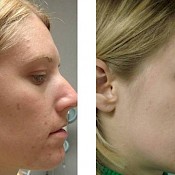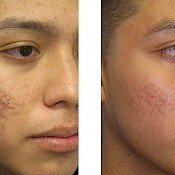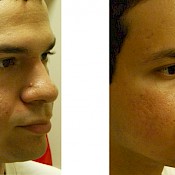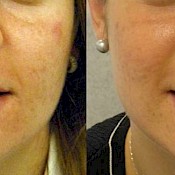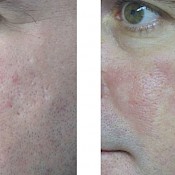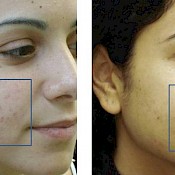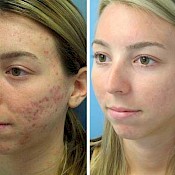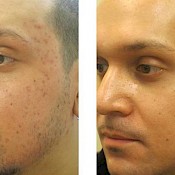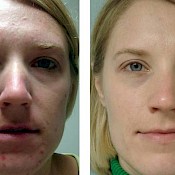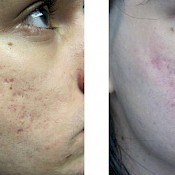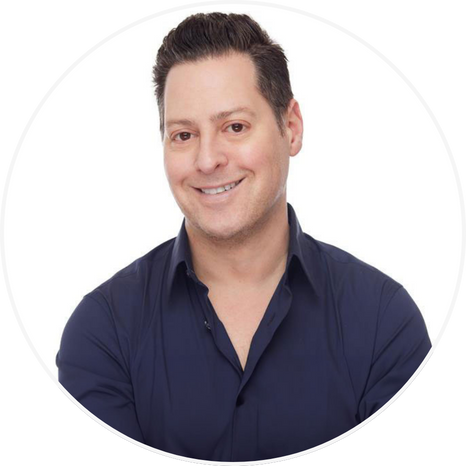Dermatologist Adult Acne Treatment
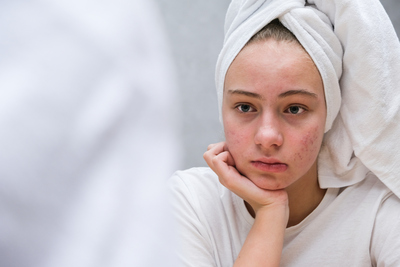 The prevalence of adult acne is increasing, and while it affects both sexes, it is more common in women than in men. In a 2018 retrospective study of 1,013 men and women, the prevalence of adult acne was 50.9 percent, 35.2 percent, 26.3 percent, and 15.3 percent among women aged 20 to 29 years, 30 to 39 years, 40 to 49 years, and 50 years and older, respectively.
The prevalence of adult acne is increasing, and while it affects both sexes, it is more common in women than in men. In a 2018 retrospective study of 1,013 men and women, the prevalence of adult acne was 50.9 percent, 35.2 percent, 26.3 percent, and 15.3 percent among women aged 20 to 29 years, 30 to 39 years, 40 to 49 years, and 50 years and older, respectively.
Adult acne can range in intensity from mild (blackheads or whiteheads) or moderate (pustules on face and body) to severe acne (swelling, irritation, or cysts).
The impact of adult acne as a chronic condition impacts the quality of life in adult patients with considerable psychological, social, and emotional effects.
At Schweiger Dermatology Group, our board-certified dermatologists and dermatology providers understand that treating adult acne demands a different approach to diagnosis and offer a tailored management plan that addresses the specific characteristics of this adult population.
Adult Acne Types
The onset of adult acne can be of two subtypes: persistent and late-onset. Persistent acne is a continuation or a relapse of the disease from adolescence into adulthood and middle age. Late-onset refers to patients aged 25 years and older who have not previously been affected by acne vulgaris.
Common Adult Acne Causes
Adult acne can be a result of hormonal changes. When women age, their levels of androgens rise. The androgen hormone directly affects sebum production and how quickly the skin sheds its cells, leading to acne flare-ups. Adult acne and acne in teens have the same basic causes, though different factors can play a more significant role in the development of acne at different ages. In addition, treatment needs are different for adult and teenage acne. Adults often have drier skin, so it is important to consider this and choose acne products with an emollient cream base. Adult acne patients often seek a combined anti-aging treatment, which retinoids can help accomplish.
Adult acne in women can often be the result of:
- Genetic Predisposition
- Hormonal Changes
- Sensitivity to Hair and Skin Care Products
- Emotional and Physical Stress
Adult Acne vs. Teen Acne
Adult acne and acne in teens have the same basic causes, though different factors can play a greater role in the development of acne at different ages. In addition, treatment needs are different for adult and teenage acne. Adults often have drier skin, so it is important to keep this in mind and choose acne products with an emollient cream base. Adult acne patients often look for a combined anti-aging treatment, which retinoids can help accomplish.
Check out this YouTube video where Dr. Eric Schweiger talks about the difference between adult acne and teen acne.
Adult Acne Treatment Options
Adult acne can be treated in various ways, including oral and topical antibiotics, oral contraceptives, spironolactone, Isotretinoin (Formerly Accutane®), laser and light treatments, and cortisone injections.
Prescription Oral Acne Medication for Adults
Tetracycline antibiotics, such as doxycycline, Doryx, minocycline, and Solodyn, are the most common oral antibiotic treatments for adult acne. In addition, Azithromycin is sometimes used for acne treatment, particularly during the summer months when excessive sun exposure while taking tetracycline antibiotics can lead to sunburn.
One new antibacterial agent, topical dapsone (Azone®), has been specifically marketed as an adult acne product. This is an excellent prescription option for adults with sensitive skin who do not tolerate benzoyl peroxide products.
Spironolactone for Adult Acne
Spironolactone is a diuretic (water pill) that also can block certain male hormones (or androgens) from interacting with the sweat glands in the face that trigger adult acne breakouts. This medicine can be used on its own or in combination with topicals to address the underlying cause of adult acne in many women.
Oral Contraceptives for Adult Acne
Oral contraceptives are effective in treating adult acne in female patients. The FDA has approved three birth control pills for treating acne, including Ortho Tri-Cyclen, Estrostep, and YAZ. They all contain a combination of both estrogen and progesterone. This combination works best to lower the amount of androgens in your body and reduce sebum production and pustule formation. Caution should be taken in using these medications if there is an increased risk of blood clots or in smokers, where the risk of clots is increased.
Isotretinoin (Formerly Accutane®)
Schweiger Dermatology Group providers have successfully used Isotretinoin medication (the original brand, Accutane®, is no longer on the market) to treat deep and painful acne cysts. When other treatment options do not work, this option has been known to diminish or clear severe acne and prevent new acne scars.
Adult Acne Laser Treatment
Laser and light treatments, such as red or blue light therapy, Photodynamic Therapy (PDT), and Isolaz laser treatments, effectively treat acne. These non-invasive laser treatments decrease the p. acnes bacteria, halt sebum production, and are anti-inflammatory. The Isolaz laser treatment uses a gentle vacuum to clear out the pores and uses light to kill the p. acnes bacteria inside the pores.
How to Clear Adult Acne Fast
Adult acne can strike at any time. For most adults, getting a pimple is just as embarrassing as when teenagers are hit with a breakout. For adult acne, the best quick fix is an in-office cortisone injection (a diluted form of triamcinolone). This injection helps decrease inflammation and dramatically reduces the size of the acne lesion.
Cortisone injections are the most effective method of getting rid of acne quickly. While there may be some redness at the injection site, there is no downtime. The medication injected into the pimple is anti-inflammatory and flattens it out in 48 hours.
Generally, with cystic acne, cortisone injections alone are not enough. We highly recommend a multi-faceted approach to include such treatments as chemical peels, PDT, laser and blue light, and prescription medications to best combat the effects of a chronic acne condition.
Treatment for Acne in Adults at Schweiger Dermatology Group
At Schweiger Dermatology Group, our experienced, board-certified dermatologists offer customized treatment plans for adult acne.
Check out our Before and After Photos of patients we have helped with adult acne.
For appointments, call Schweiger Dermatology Group at (844) DERM-DOC.
To find a location near you, check out our location pages. We look forward to working together to find the best treatment for your skin!
